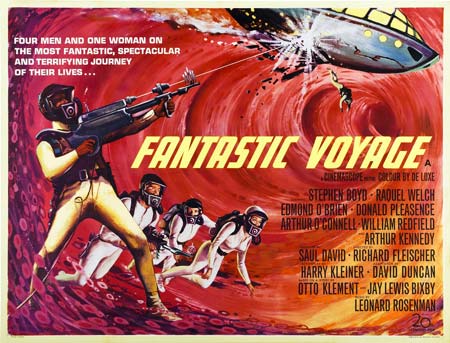
FANTASTIC VOYAGE
US, 1967, 100 minutes, Colour.
Stephen Boyd, Raquel Welch, Arthur Kennedy, Donald Pleasence, Edmond O'Brien, William Redfield, Arthur O'Connell.
Directed by Richard Fleischer.
Fantastic Voyage is competent science-fiction. It uses many stock adventure situations of difficult journeys plus spies, but gives them a certain novelty and freshness by making it a journey through the human body.
Needless to say, the special effects people contribute the most talent and the authentic tone given to the film by the sets and the plausibility of the whole set design enhance the enjoyment of the film. The actors have very little to do but go through their paces each doing the usual thing. Raquel Welch appears in a generally subdued role.
Director Richard Fleischer is versatile. He directed this film at the time of doing Doctor Doolittle and The Boston Strangler. Enjoyable and far less 'corny' than one might suspect.
1. Did the name sum up the film well?
2. Was this an enjoyable adventure? Why?
3. How plausible was the story?
4. How plausible, in terms of scientific background, use of human physiology and cinema techniques was the presentation of the story?
5. Did it matter for the enjoyment and credibility of the film whether it was all plausible or not?
6. Was the political background to the film any more than stock material? Why?
7. Did the military have any right to miniaturise Grant and send him into the body? Does the military have the right to impose on citizens?
8. Comment on the cinema techniques used to show the miniaturising and make it credible.
9. Was the 60 minute limit for being in the body a successful suspense device? With the crosscutting to clocks, to the computers and trackers and to the generals outside?
10. Was it important for the characters to be well-drawn? The General with the sugar, the doctors?
11. Did you suspect Dr. Michaels as the saboteur? Did you suspect anyone? Why?
12. Comment on the presentation of the voyage in the body ? the beauty, the physiological structures and processes, the voyage through the heart, the antibodies, the ear, the clots on the brain.
13. How well were adventure crises combined with the physiology, stopping the heart, getting the air pressure in the lungs, clearing the clogged engine shafts, Cora and the antibodies, the fall in the ear (and the corresponding tension outside), Grant being blown about in the ear, the final crisis and Michael's death, coming out through the optic nerve in a tear?
14. What is the value of this kind of film, entertaining, instructive, exciting? Any other value?